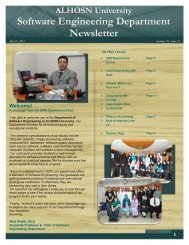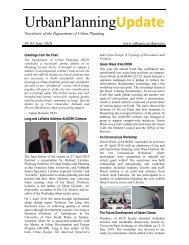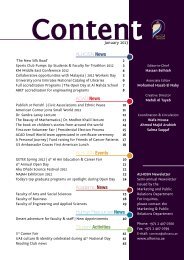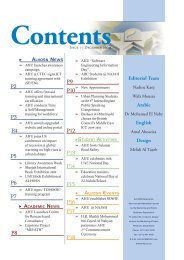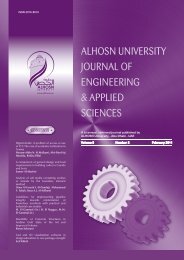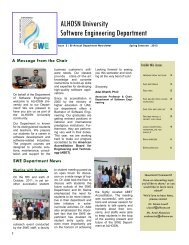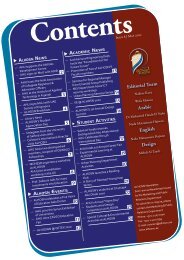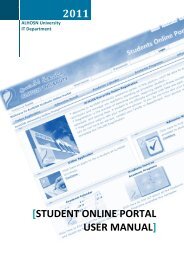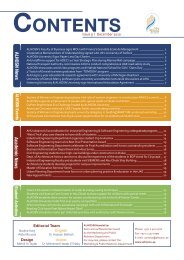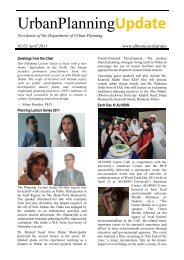ALHOSN University Catalogue Global Knowledge with Local Vision ...
ALHOSN University Catalogue Global Knowledge with Local Vision ...
ALHOSN University Catalogue Global Knowledge with Local Vision ...
You also want an ePaper? Increase the reach of your titles
YUMPU automatically turns print PDFs into web optimized ePapers that Google loves.
and socially responsible.<br />
The above objectives will be reached through an intensive four year study program and one summer<br />
internship. In the first two years, students will develop broad background in engineering, while the final<br />
two years will focus on areas of municipal engineering, engineering economics, project management,<br />
environmental engineering, structural engineering, geotechnical engineering, resource management, and<br />
transportation engineering. Following is a broad outlook of the Four year program.<br />
Year 1: Students will be exposed to general education of <strong>University</strong> requirement courses in order for<br />
them to develop the aptitude for higher education. Specifically, they will be involved in Calculus,<br />
Mechanics, Computers, Introduction to Engineering, Chemistry, Differential Equations, Linear Algebra,<br />
Electromagnetism, communication skills, and an elective general studies course.<br />
Year 2: Students will be engaged in a number of Mathematics, Geology, and Engineering courses. In<br />
particular, they will be involved in Advanced Mechanics, Mechanics of Solids, Thermodynamics,<br />
GIS, Surveying and Graphics, Engineering Geology, Numerical Methods, Mathematical Methods,<br />
Materials, and Fluid Mechanics.<br />
Year 3: Students will begin to specialize in Civil Engineering. They will be exposed to various fields in<br />
civil engineering, including Structural Analysis and Design, Soil Mechanics, Engineering Economics,<br />
Structural Materials, Statistical Modeling, Specialized advanced Mechanics, Design Courses (steel,<br />
concrete, etc.), Transportation, Basic Water Resources Management, and a number of civil engineeringrelated<br />
elective courses.<br />
Year 4: Students will complete their Civil Engineering requirements. They will be exposed to the<br />
following general civil engineering topics: Engineering Project Development and Management,<br />
Geotechnical Engineering, Municipal Engineering, Highway Engineering, and Water Resources System<br />
Design and Management.<br />
The BSCE Program at <strong>ALHOSN</strong> <strong>University</strong> will have 130 credit hours of study program and one<br />
summer internship program. Each course will count toward 3 credit hours.<br />
Training and Internship (CIV 499)<br />
The BSCE degree includes a mandatory Training and Internship component of one summer semester in<br />
the Third Year of the program. This training provides practical on-the-job experience to compliment the<br />
university classroom studies. Training and Internship is an integral component of the degree program.<br />
This work experience helps students develop an understanding of the industry that they will need in<br />
their professional careers. It allows students to transition between the classroom and field applications<br />
and allows them to see the big picture of the industry that they will be required to serve and lead.<br />
BSCE Program Outcomes<br />
Upon completion of the BS in Civil Engineering program, graduates will be able to:<br />
a. Acquire and apply basic knowledge of mathematics and science.<br />
b. Design and conduct experiments, as well as to analyze and interpret data.<br />
c. Design a system, component, or process to meet desired needs <strong>with</strong>in realistic constraints such<br />
as economic, environmental, social, political, ethical, health and safety, manufacturability, and<br />
sustainability.<br />
d. Function on multi-disciplinary teams.<br />
e. Identify, formulate, and solve engineering problems.<br />
f. Recognize the professional and ethical responsibilities of civil engineers.<br />
g. Communicate ideas effectively.<br />
h. Understand the impact of engineering solutions in a global economic, environmental, and<br />
societal context.<br />
i. Engage in life-long learning.<br />
j. Recognize current best practices and contemporary issues in civil engineering.<br />
k. Apply the techniques, skills, and modern engineering tools to design civil structures.<br />
95




